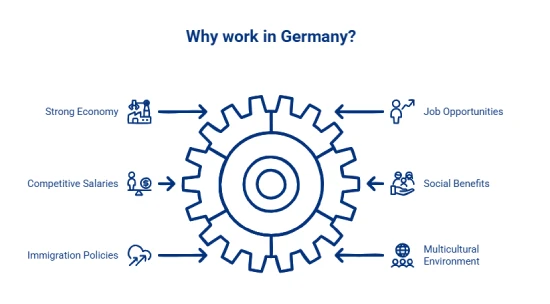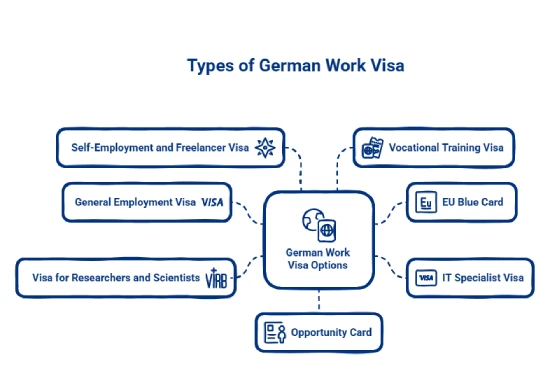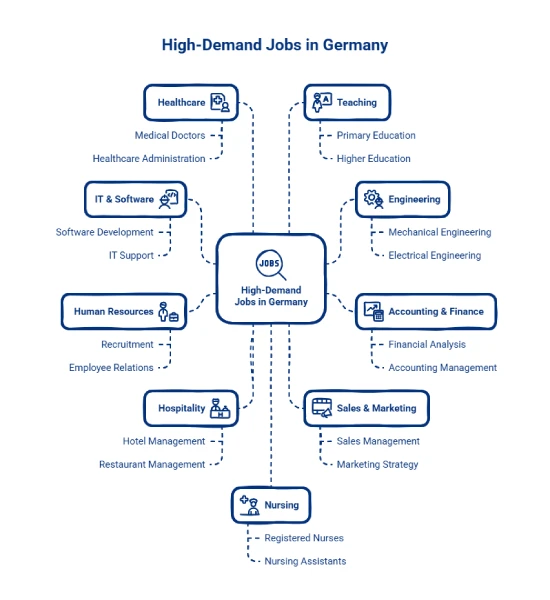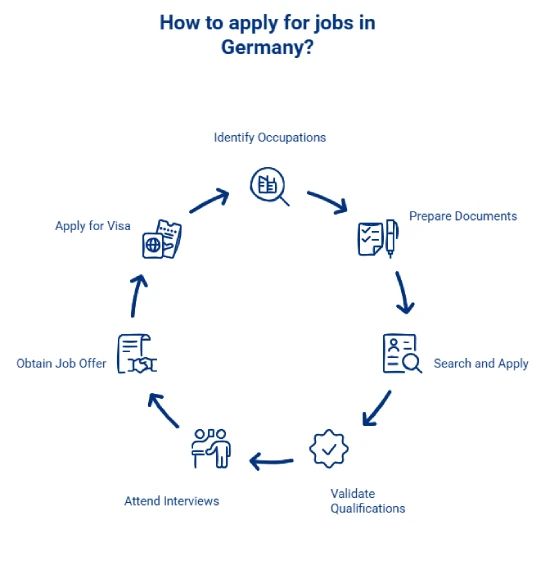Germany is looking for skilled workers, with around 400,000 skilled jobs unfilled each year in areas such as engineering, healthcare, IT, and construction. For individuals with the right skills, this is a great chance to grow their careers, make good money, and find quicker routes to residency and citizenship.
| Occupation | Annual salary (Euros) |
| Engineering | € 58,380 |
| Information Technology | € 43,396 |
| Transportation | € 35,652 |
| Finance | € 34,339 |
| Sales & Marketing | € 33,703 |
| Childcare & Education | € 33,325 |
| Construction & Maintenance | € 30,598 |
| Legal | € 28,877 |
| Art | € 26,625 |
| Accounting & Administration | € 26,498 |
| Shipping & Manufacturing | € 24,463 |
| Food services | € 24,279 |
| Retail & Customer service | € 23,916 |
| Healthcare & Social services | € 23,569 |
| Hotel Industry | € 21,513 |
Germany has a strong economy and is a leader in fields like engineering, manufacturing, and tech. With low unemployment rates, good salaries, and a great quality of life, it's a popular choice for skilled workers from all over.

A Germany Work Visa is a long-term visa that lets non-EU citizens live and work in Germany. It is mainly for skilled workers who already have a job offer from a German company. This visa can help you get a residence permit, which could eventually lead to permanent residency. To apply, you need to meet certain qualifications, show you can speak the language, and prove you have enough money.
*Want to apply for a German work permit? Let Y-Axis guide you with the process.
Germany has several work visa options to welcome skilled workers, entrepreneurs, researchers, and graduates from all over. These visas help fill job market gaps, encourage innovation, and give international talent a clear path to working and living in Germany. Each visa has its own requirements based on qualifications, experience, salary, or job type.
Here is a list of the work visas available in Germany:

Germany offers lucrative career paths across engineering, IT, finance, and healthcare sectors. Whether you are an experienced professional or a recent graduate, these roles present competitive compensation and strong job prospects.
Germany's tech scene is booming, with high demand for software engineers, developers, and IT pros, particularly in Berlin, Munich, and Hamburg.
Average Salary: ~€71,300/year
Salary Range: €61,650 to €87,400/year
Engineers in mechanical, civil, electrical, and similar areas are needed across Germany's industries.
Average Salary: ~€92,500/year
Salary Range: €64,500 (entry-level) to €115,000+ (senior)
Accountants and financial analysts play important roles in Germany’s corporate world.
Average Salary: ~€54,000/year
Salary Range: €41,500 to €82,800/year
HR professionals are crucial for hiring and managing company policies with a huge demand in Germany.
Average Salary: Similar to accountants/engineers
Salary Range: About €50,000 – €80,000 depending on experience
Chefs, hospitality managers, and tourism professionals are finding more opportunities as travel picks up post-COVID.
Average Salary: ~€50,000 – €60,000/year
Marketing and sales experts are in demand in both corporate and tech environments.
Average Salary: ~€60,000 – €90,000/year
RNs and medical technologists are always needed in the healthcare system.
Average Salary (RNs): ~€60,552/year
Salary Range: €42,936 – €74,968 (entry to senior)
Teachers at all levels enjoy stable roles, especially in public schools.
Average Salary: ~€48,500/year
Salary Range: €40,200 – €66,600 depending on experience
Nurses, especially in ICU and specialty areas, are increasingly sought after as the demand for healthcare workers rises.
Average Salary: ~€33,000 – €42,000/year (about €3,000–4,000/month)

*Want to work in Germany? Sign up with Y-Axis to guide you with the steps.
The eligibility criteria to apply for a work visa in Germany is as follows:
You must fulfill the below requirements to be able work in Germany:
You can follow the steps below to apply for a job in Germany:
Step 1: Identify in-demand occupations in Germany
Step 2: Prepare your documents
Step 3: Search and apply for jobs online
Step 4: Validate your qualifications (if required)
Step 5: Attend interviews
Step 6: Obtain a job offer in Germany
Step 7: Apply for a German work visa

Y-Axis is the world's No.1 overseas Immigration consultant, providing unbiased and innovative immigration assistance for 25+ years.
Our team of experts will assist you with:
Explore what Global Citizens have to say about Y-Axis in shaping their future
Germany Opportunity Card Visa
Y-Axis Client Likith Kanalli on His Germ
Read More...
Germany Job Search
One of our client Vamsi has opted for Ge
Read More...
Germany Jobseeker Visa
Y-Axis received a great feedback from Po
Read More...
Germany has a labour shortage in several areas because of an aging population and growing needs in certain industries. Some jobs that are in high demand include:
Note: The Federal Employment Agency points out these fields as key areas for skilled workers from abroad.
To get a work permit in Germany, you must meet these requirements:
The most in-demand careers in Germany include:
Note: Germany updates its shortage occupation list regularly, so skilled workers in these fields often have smoother visa processes.
You can follow the below steps to apply for jobs in Germany:
Step 1: Check if your occupation is eligible for skilled migration.
Step 2: Create a CV and cover letter that fit German standards.
Step 3: Look at job portals like Make It in Germany or LinkedIn.
Step 4: Apply directly to companies or through recruitment agencies.
Step 5: Attend interviews (virtual or in-person) and get a job offer.
Step 6: Apply for your work visa or EU Blue Card with the necessary documents.
Germany has several work visa options for non-EU citizens:
To qualify for a work visa in Germany, you need:
To apply for a work permit in Germany, you can follow the below steps:
Step 1: Get a job offer in Germany.
Step 2: Make sure your qualifications are recognized there.
Step 3: Gather documents (passport, job offer, qualifications, insurance).
Step 4: Book a visa appointment at a German mission.
Step 5: Submit your application and go to the interview.
Step 6: Wait for approval and then travel to Germany to start working.
Yes, you can apply for jobs in Germany from abroad. The Opportunity Card, which starts in 2024, lets candidates move to Germany for up to a year to look for a job. If you get an offer while still abroad, you can apply for a work visa and enter Germany to start your job legally.
The average gross salary in Germany is about EUR 49,260, but it can vary a lot based on the job and location:
While the focus is on skilled workers, there are some unskilled jobs in demand in areas like:
Note: These positions often require sponsorship from an employer and adherence to minimum wage laws.